10 Apr. 2024
SPIRITS OF SUNGOLIATH #898 SAM JEFFRIES
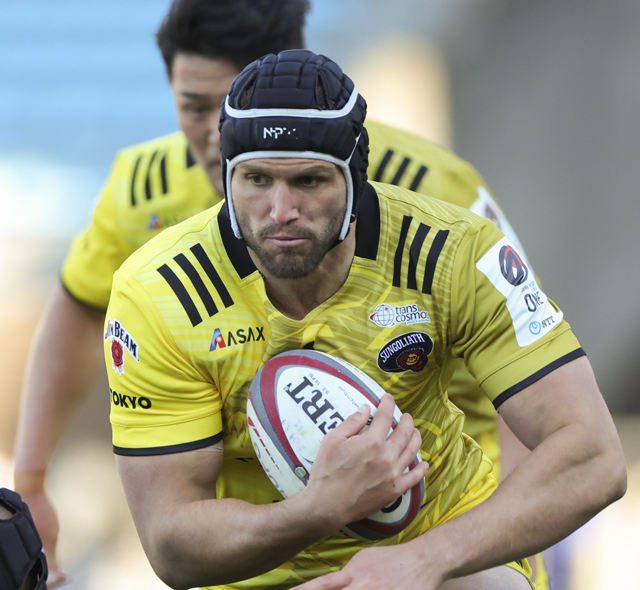
SAM JEFFRIES " Breathing new life into the team"
Always collected and calm, even in the hardest moments of the game- that's Jeffries to us. One interview certainly did not cover how much he has got to share with us. (Interviewed end of March 2024)
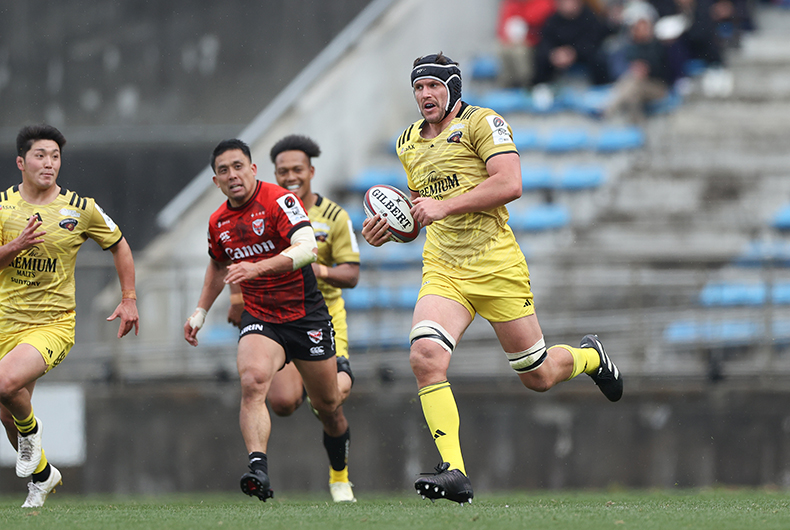
◆Rainy games excite me
――You have appeared in 8 games this season (as of Rd11), after coming to Japan. How are you feeling?
For my first year in Japanese rugby, I think it's been very positive, and I've been enjoying the experience. It's been a different style of rugby from what I experienced before and it's been a really good challenge to see how Japanese style of rugby is played. It's a good competition, good style of rugby and there are some big names playing this year. I feel very lucky to be playing for a club like suntory which is very well respected, we have lots of amazing athletes here, and is a good club that strives to be the best team in Japan. So I feel lucky to be a part of this club.
――Do you feel the difference in the speed of the game?
Back home in England, about 70% of our games we play are when the ball is wet. So, priorities for the teams when we play in a condition that is normally wet is to be more forwards focused, kick to gain territory, and defence. But here in Japan, they want to play the ball more, and because Japanese style is to play quick, there is a difference in the emphasis on the speed of the ball. I also feel the ball in play time is higher here.
So it's been really nice to see that different style, and that teams have different emphasis on how they want to play. Like here in Suntory, we've got a real pride in aggressive attacking rugby, whereas back home so many teams have got a strong focus on set piece.
――Does that mean we could expect more from you when it's wet then?
Yes. I always pray for the rain here (laughs). It's the forte of my game.
――Do you feel the differences in sizes of the players?
Yes, especially in the forwards. The average weight of a forwad here is probably 5-6kgs lighter than back home, but when you see the GPS reports, forwards here run far, far more than any teams in England. So it fits the they want to play- fast and quick, so the players are lighter.
――You have adapted to running more, so no doubt you are very fit.
I think we all like to think we are as fit as we can be (laughs)
――Do you think you have adapted for the speed of the game too?
Yes, I think I was quite lucky that the club I was with before, Bristol, had quite a similar mindset at how they like to attack, so there have been some similarities which made the transitions easy.
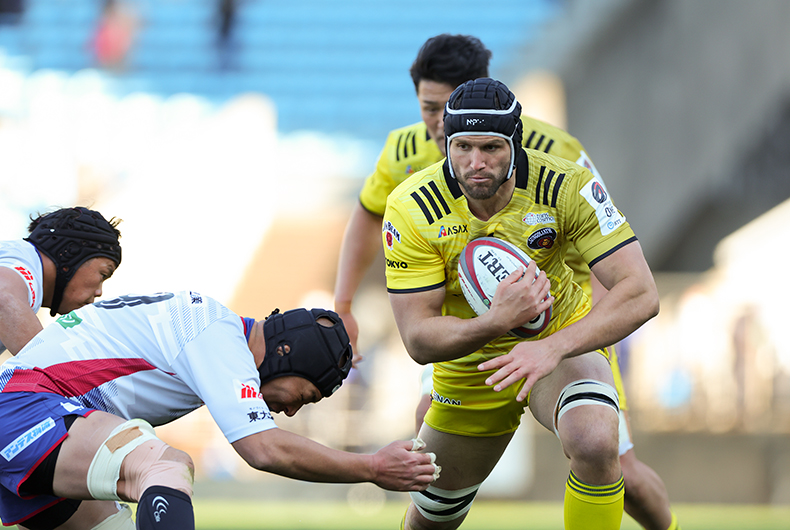
◆New Challenges
――Did you choose to join Sungoliath knowing those similarities such as attacking style, from your previous team?
Yes, and also the prestige of the club was a huge pull. It is a club that all the famous players have played before. I've played with George Smith and Tusi Pisi before, and they've talked about Suntory when I spoke to them about Japan. It was a club that I knew of for its reputation and it's a real privilege to be able to play for a club like this. So that was a big pull to come here- it's one of the best teams in Japan.
――What was the main reason for you to come and play in Japan? It's the first foreign country you play in.
First and foremost what made the decision easy is that I've been to Japan before in 2016 to visit a friend here and I've absolutely loved the country, it's an amazing place. So the thought to come and live here was really exciting anyway. But the new challenge for me was the rugby- like we said, the different style here, is the new challenge for me to be excited about. And as I am at a point with my career where I am a little bit more experienced, I was looking for a new challenge and also the ability to offer some of my experiences to help the younger players.
Also, with the different background I have to coming here, I like to think I can help the players especially with the set piece dominance we have in the UK. To bring that here, and upskill the players, is exciting.
――Do you look after the young players in the team and share your experiences?
One of the things I enjoy the most is seeing how the young players in the team are growing and developing. Young players that want to learn and develop. Players like Katakura- you can see he's young and have the thirst to learn and get better, and drives himself to be a good lineout leader. So it's nice, as you get older, as you have been there as well- now you're older, you're doing the role that your role models had on you at an earlier stage of your professional career. You feel that you're giving back to the young guys to be a positive influence, lead themselves, and hope they'll play for Japan.
――Katakura is going to be very happy reading your comments.
He's unfornately going through a few injuries, but that's exactly what I went through when I was coming through- quite a long run of injuries. It's difficult, but from the way he has been reacting to these injuries, you can tell that he's got his mindset right, so he will be successful.
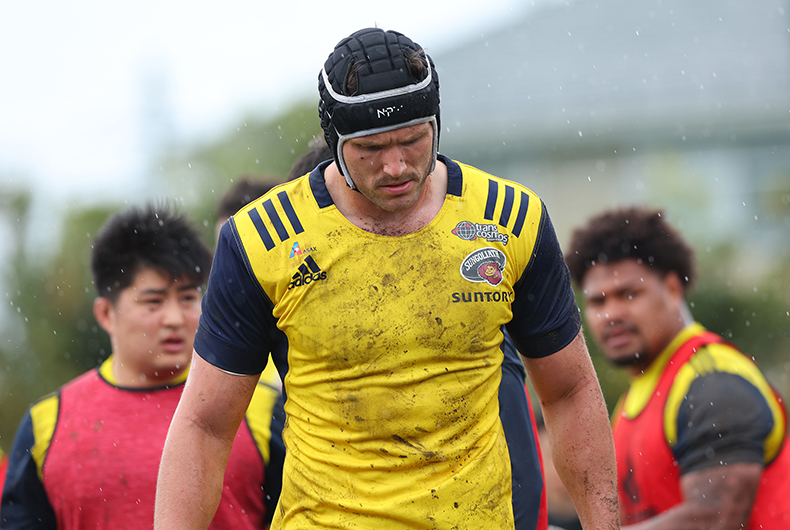
◆Practise and learn
――You really are a true English gentleman!
I don't know, am I? (laughs)
――You seem very cool headed during games. Do you ever get upset?
My wife gets very frustrated that I'm always very logical minded and cool headed (laughs). But it is funny, it's probably my strength as a professional athlete. I'm quite in touch with my mindset and how I perform, and I don't get affected by the emotional side of things, and obviously rugby being a physical sport, it can happen. But am very next job oriented and I have a good awareness to understand what my role is for the team. And I think that's where my strength is, understanding the bigger picture and where I fit into things, and where my role is. Again, that comes with experience as well, and I hope to help younger players develop as well.
――Well you're certainly tall enough to see the bigger picture!
Haha (laughs)
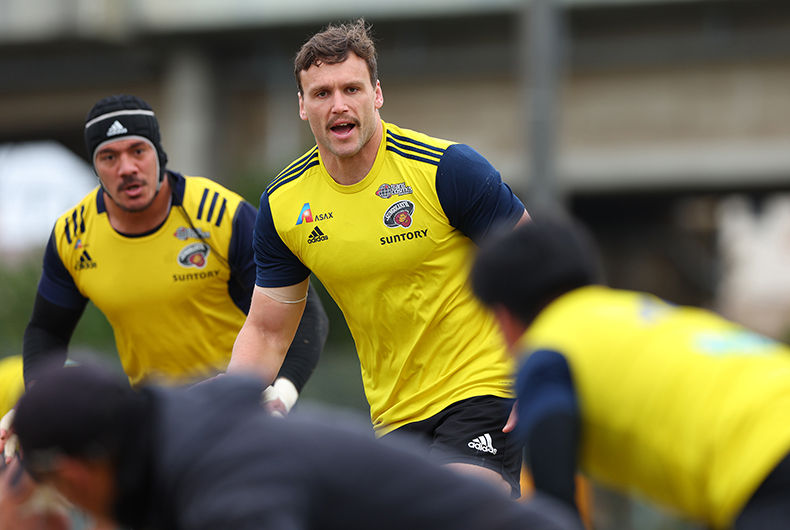
――Focusing on your next play, your next job- am sure you didn't have that at the start of your career. How did that come about?
It's certainly something you learn, and it becomes your skill. You have to practise, and learn how you approach your game. One of the big things we learnt that has inspired us is from the All Blacks- Blue Head and Red Head. It's an idea that Red Head is your emotional side, that can react to things, that has emotional reactions, whereas your Blue Head thinks coolly and logically.
It's techniques you learn from different people and that's why when you see all the role models, they have got a clear mindset and drives, and they don't let emotions sidetrack or derail them.
I think I'm naturally driven and have good motivation, so I could apply myself easily. And I think naturally I have always been on the blue side of things which made it easier. It definitely requires techniques and skills, like if you are in the Red Head, how do you turn to Blue Head, thinking about the next job. Rugby is chaotic and anything can happen, so you need to be able to refocus and get back onto focusing on what your next job is for the team.
――That is certainly a technique. Do you enjoy controlling those mental side as a part of your game?
In some ways, I think talent is your natural ability to pickup your skills, and for me, some of my strongest talent has been on that side of things- mental preparation and the way you're professional off the field to help with the performance. Those are the things I found easy in my career.
It's probably the skill side that I am more challenged. For me am naturally more inclined to control what I can, what I need to do, what my strength are, whereas I had to develop the skill side of things. I had to work hard for that.
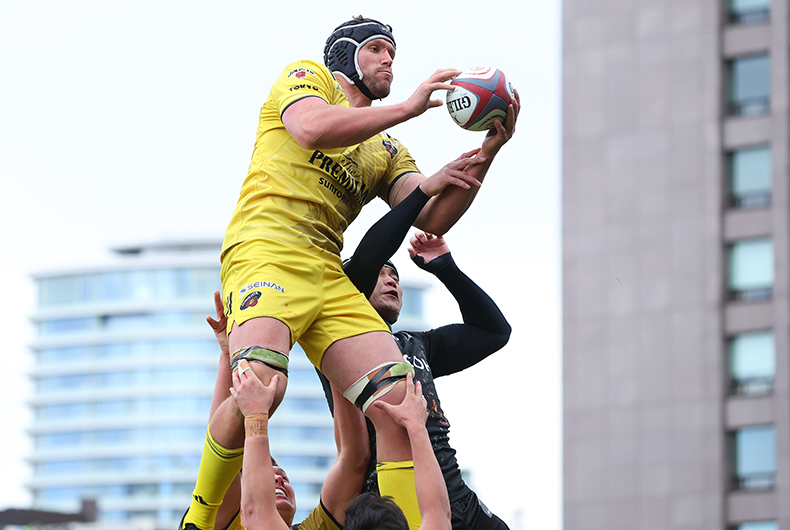
◆Unseen, inglorious work that supports the team
――What part of lineouts and tackles are your strength?
It's quite funny, am not actually the springiest athlete, nor the best jumper, but I'm quite physical in the lineouts, maul attack, defence, and I pride myself in being important for the team there. It is a kind of a role that doesn't take a lot of glories as hookers score the tries, or when you do stop a maul but if they play off, you don't really see the hard work- but those are the things locks are need for. It's the same in field plays- being effective in breakdowns, is not something that people would highlight when they watch rugby but doing the hard work in the graft is what I really enjoy about the sport. I take real pride in being good at that and helping the team for that reason, so those are the things that people don't necessarily appreciate, but especially for us in that role, it's something I value a lot when I see players good in that skills, and how important it is for a successful team.
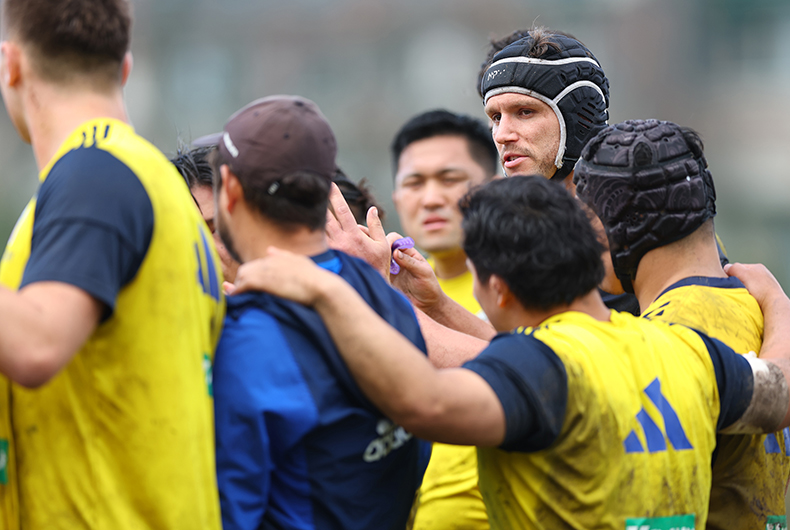
――Your childhood dream was was to become an inventor?
When I was growing up and if people as what I'd like to be when I grow up, the first thing I wanted to be was an inventor.
――Have you invented a rugby skill?
Not yet (laughs), I haven't been that innovative in that sense yet. Lot of copyrights....(laughs)
――How's the attacking side of the game going for you?
It's definitely an area of the game, or the style of the game, that's different here in Japan. That's the area that I've adapted the most, understanding how we attack here in Japan is very different to how we attack back home. It's a part of the game that I had to grow and develop the most since I've been here, particularly in my ball carry, because I have way more opportunities to carry the ball here than I did back home. I think there's still growth in there, and I think it's good that I'm always learning.
It's interesting to see how the best players do it here and understand where the strength come in. The coaches have been very beneficial, the focus on the small detail, for things like ball carry has been brilliant. So there's definitely been a lot to upskill in the area, which is awesome.
Again, the area I take pride the most in attack is the person who does that hard work in the breakdown and lots of involvement for the team- doesn't necessarily mean I'm going to have lots of line breaks or score tries, but to facilitate everyone in the team to do that.
――Do you carry a lot more than you did back home?
It's because in England, with the ball being wet, teams want defend the ball and kick for territory, so you spend more time defending if you are to play. And when you do have the opportunity to attack it's normally within the 22m so it's more small carries, whereas in Japan, you will probably have a lot more time with ball in your hand. As a lock, there is a responsibility on how to gain the hard yards for the team.
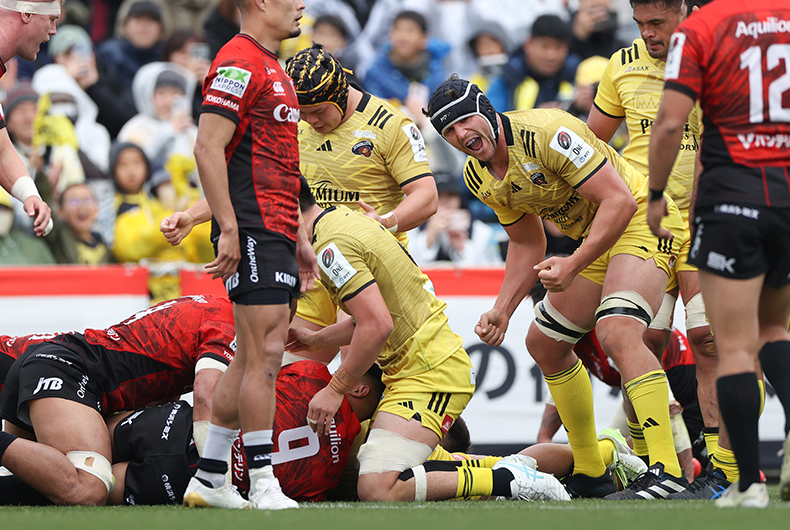
◆Momentum as a Forwards Pack
――We're in the final block of the season almost. What are your goals?
First of all we have to reach the play off. So the goal of this next block of games is to make sure we do what we can to make sure we're in the final part of the season that really matters. So for me between now and them, I want to help drive the team get the momentum into the play off, so when we do get to play offs we're in a good place. I take a lot of responsibility with Harry Hockings in driving our lineout plans with Ao-san (set piece coach), so making sure our set piece in our attack is really strong, we have a real clarity in how we want to play, and that we have a good plan each week for each of our opposition, so we have momentum as a FW pack that we can take into play offs.
Crucially, when it comes to play off games, it's going to come down on the roles of FWs- how we defend will have a huge impact on how we perform. Obvisly, we want to play aggressive attacking rugby but there's a lot we have to do, to be able to do that- which means we have to get the ball back when we defend, including winning the ball at set piece. That's where I take the responsibility for in helping to drive the team, with other leaders, and it's something I hope we can do well as we lead towards the end of the season.
――Your Blue head is going to crucial for the team in the play offs.
I hope so, yes (laughs)
――What is your long term goal?
I've not quite decided what I want to do in my life after rugby. I actually retired between the age of 26-28 and was working as a PDM for my team in the UK. It was interesting that I saw the operations and the commercial side of the sport. I feel like I have a good understanding of the sport and the business of the rugby as well as the performance side of the rugby.. With these experiences, I've always got the opportunity to give back to the sport through different roles.
I do think that I could consider coaching as something I potentially want to do- but am still not sure with what my life will look like after rugby, knowing the challenges and responsibility that comes with coaching, and for your families as well. Still undecided, but I do enjoy the element of coaching that you can do as a player. We'll wait to see how it turns out, and who knows which way life will take you.
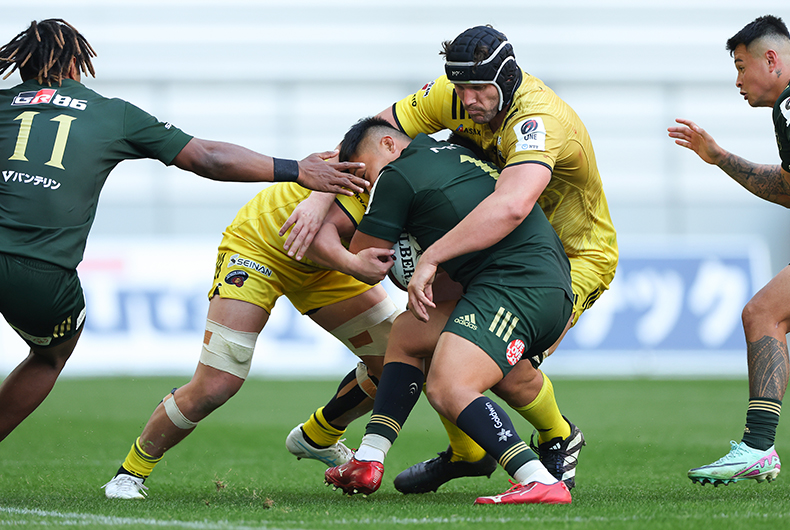
◆Culture of the group represented in defence
――What were the reasons you were retired for a couple of years, and how did you come back to playing again?
I retired due to rehabilitating my patellar tendon. There wasn't any rehabilitating program that was working. Got to the point that taking a step back was probably the best thing. Planned that idea of taking a step back is off Juan Hugo Smith, a springbok 2007 winner, he retired after the 2007 world cup through his achilles tendon issues. He actually went back to work for the XX for 2 years, afterwards it started to feel good again so he went back to Toulonnais. When I retired I went back to work as a PDM for Bristol Bears and whilst I was working I was doing my own rehab in the gym along side the office job. It actually started to feel good and I actually started playing again.
Traditional program for patellar tendon injuries are all quite isometric. Heavy load on patellar tendon to see if it can actually manage the pain. But I kind of worked out that I had more a biomechanic issue that causes the knee to overload, so it was more to fix those issues. I did quite a bit of readings. In a sports environment medics are always trying to get me back on the field as soon as possible, but I had the time to really get it right with a holistic approach. Kind of did it all myself to work it out. It was funny coming back from working in the office and 8 months later, I was in England squad- so it ended up being quite good.
I started training with the Academy at Bristol, it was during covid period as well so I started training with them and I came back. Started coming to First team training and some A team games and I was offered a contract to come back in. Next season I slowly made my way to getting back into the team and played quite a lot of games, so it worked out well. The way the club managed me was really good- saw a lot of value in me as a PDM role, so they wanted me to be that first, and if I could play that was a bonus. In the back of my mind I knew I will come back, so I did everything I could to get back.
――I could also see you being successful as a business person, in a corporate setting?
There are a lot of transferable skills. From performance sport, especially in rugby where they talk a lot about mindset, how you approach things, they all apply to all sorts of different careers. So I like to think wherever I go into, I can apply myself in how I did with rugby and use my natural talents in that sense, like staying motivated, being cool headed and logical in how you think. I still haven't decided which is the best way to apply myself in the future, but am sure it'll be exciting.
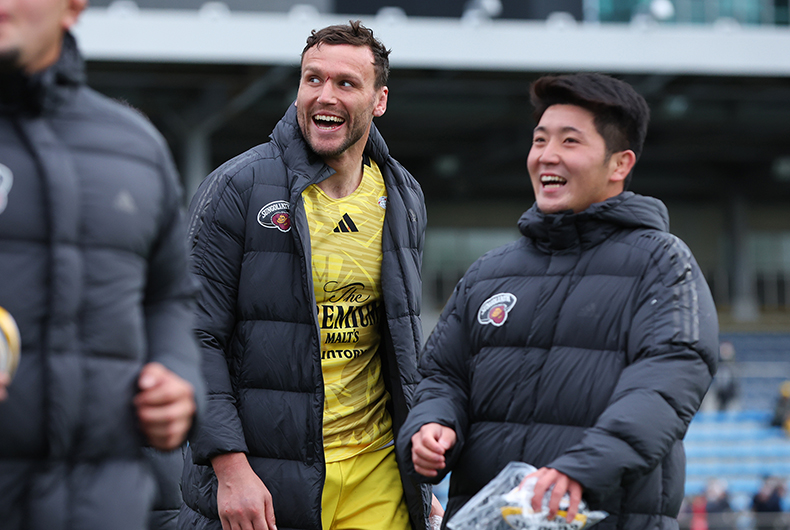
――What is the best moment for you when you play rugby?
My favourite feeling in rugby is when the team has a big defensive effort, and you win a game through physicality and hard work, and your teammate put their bodies on the line. I really enjoy that. That feeling when you get a turnover, and when you win a game through defensive effort. I think it really show the real heart of what the team is really about. The culture of the group is best represented in defence. So for me it's always seeing the pride that the team has, when they turn the ball over, stop a promising attack, chase back off a line break..seeing your teammates put their bodies on the line- there are the things I enjoy the most in rugby.
(Interview & Structure: Kazuyoshi Hariya /Translator: Shino Kusunose)
[Photo: Aki Nagao]
